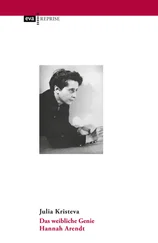21. Philippe Sollers, Guerres secrètes (Paris: Carnets Nord, 2007): “D’après la révolution opérée par la Contre-Réforme…”
27. A RUNAWAY GIRL
1. Louise Bourgeois, “Entretien entre Louise Bourgeois, Suzanne Pagé, Béatrice Parent,” in Louise Bourgeois, Sculptures, environnements, dessins, 1938–1995 , catalog of Musée d’Art Moderne, Paris, 1995 (my translation — LSF); various quotations also taken from Louise Bourgeois, Destruction of the Father/Reconstruction of the Father: Writings and Interviews, 1923–1997 , ed. Hans-Ulrich Obrist and Marie-Laure Bernadac (Cambridge, Mass.: MIT Press, 1998).
2. Christopher Marlowe, Hero and Leander , I, 167–68, in Complete Works (Cambridge: Cambridge University Press, 1973), 2:435.
3. Julia Kristeva, The Female Genius , II: Melanie Klein , trans. Ross Guberman (New York: Columbia University Press, 2004).
4. Julia Kristeva, Murder in Byzantium , trans. C. Jon Delogu (New York: Columbia University Press, 2005).
5. John of the Cross, Ascent of Mount Carmel , book 2, chap. 31, trans. and ed. E. Allison Peers (Tunbridge Wells, U.K.: Burns & Oates, 1983), 205: “It is as if Our Lord were to say formally to the soul: ‘Be thou good’; it would then substantially be good.”
6. Life , 15:8, CW 1:143–44.
7. William Blake, Complete Writings (Oxford: Oxford University Press, 1972), 71: “To Nobodaddy.”
8. Robert Storr, Paulo Herkenhoff, and Allan Schwartzman, Louise Bourgeois (London: Phaidon, 2003), 24.
9. Cf. Marcel Proust, “Time Regained,” in In Search of Lost Time , trans. and with an introduction and notes by Peter Collier, ed. Christopher Prendergast (London: Penguin, 2002), 6:292–321.
28. “GIVE ME TRIALS, LORD; GIVE ME PERSECUTIONS”
1. Letter 253, to Juana de Ahumada, August 8, 1578, CL 2:89.
2. Way , 12:1, CW 2:81.
3. Medit ., 7:8, CW 2:259.
4. Ibid.
5. Testimonies , 46, CW 1:412; Seville, second half of 1575. Michel de Goedt writes: “Christ treated her as a spouse and a sovereign, and granted her the freedom to make use of his own property, the most precious good of all, his Passion” (“La prière de l’école de Thérèse d’Avila aujourd’hui,” in Recherches et expériences spirituelles , lectures edited by the Cathedral of Notre-Dame de Paris, 1982). Note that in Spanish, the terms chosen by the writer are laden with sensuality. Thus señorío means “mastery over something,” as though one were a seigneur , lord or owner. “Power,” “conquest,” “taming,”— señorío is the “dominion” I exercise over you as much as the “demesne belonging to a feudal lord.” Likewise, alivio denotes “the relief or cure for an illness,” the “alleviation of fatigue, of bodily sickness, of spiritual affliction”; the result of an “elimination of a burden or trouble.” Alivio conveys “easing,” “abatement,” “solace.”
6. Medit ., 7:1, CW 2:256.
7. For the testimonies gathered as evidence for the beatification and canonization of St. Teresa, see Gillian Alghren, Teresa of Avila and the Politics of Sanctity (Ithaca: Cornell University Press, 1998), 154 et seq.
8. Way , 7:8, CW 2:70: “I would not want you to be like women.”
9. Way , 38:8, CW 2:181 (paraphrased): “And so as to reign more sublimely it understands that the above-mentioned way [suffering] is the true way.”
10. For the cucumber anecdote, see Marcelle Auclair, La vie de sainte Thérèse d’Avila (Paris: Seuil, 1950), 140.
11. Letter 92, to Jerome Gratian, October 1575, CL 1:233.
12. Ibid., 234.
13. Letter 248, to Mother María de San José, June 4, 1578, CL 2:80.
14. Found ., 7:4, CW 3:135–36. The original passage in its entirety runs as follows: “Si no bastaren palabras, sean castigos; si no bastaren pequeños, sean grandes; si no bastare un mes de tenerlas encarceladas, sean cuatro: que no pueden hacer mayor bien a sus almas. Porque, como queda dicho y lo torno a decir (porque importa para las mismas entenderlo, aunque alguna vez, o veces, no puedan más consigo), como no es locura confirmada de suerte que disculpe para la culpa, aunque algunas veces lo sea, no es siempre, y queda el alma en mucho peligro; sino estando — como digo — la razón tan quitada que la haga fuerza, hace lo que, cuando no podía más, hacía o decía. Gran misericordia es de Dios a los que da este mal, sujetarse a quien los gobierne, porque aquí está todo su bien, por este peligro que he dicho. Y, por amor de Dios, si alguna leyere esto, mire que le importa por ventura la salvación.”
15. Way , 19:4, CW 2:108.
16. Const ., 24, CW 3:327.
17. Const ., 26, CW 3:327.
18. Const ., 44, CW 3:448.
19. Way , 19:9, CW 2:111.
20. Way , 19: 9–11, CW 2:111–12.
21. Const ., 44, CW 3:448.
22. Letter 161, to Mariano de San Benito, December 12, 1576, CL 1:430–31.
23. Testimonies , 53:1, CW 1:415.
24. Testimonies , 54, CW 1:416.
25. Letter 108, to Jerome Gratian, June 15, 1576, CL 1:280.
26. Life , 21:11, CW 1:190.
27. Way , 15:1, CW 2:91.
28. Letter 182, to Lorenzo de Cepeda, February 10, 1577, CL 1:494.
29. Life , 13:4, CW 1:124.
30. Life , 13:7, CW 1:126.
31. Life , 13:5, CW 1:125.
32. Way , 39:3, CW 2:190.
33. Found ., 28:21–34, CW 3:258–63.
34. Testimonies , 19, CW 1:394.
35. Testimonies , 17, CW 1:394.
36. Life , 22:15, CW 1:199.
37. Life , 22:16, CW 1:199.
38. Life , 22:10, CW 1:195.
29. “WITH THE EARS OF THE SOUL”
1. See Julia Kristeva, “The Semiotic and the Symbolic,” in Revolution in Poetic Language , trans. Margaret Waller (New York: Columbia University Press, 1984), 19–106.
2. Testimonies , 58, CW 1:423.
3. Sigmund Freud, Totem and Taboo , trans. James Strachey (London: Routledge and Kegan Paul, 1999), 153.
4. VI D , 2:6, CW 2:369.
5. VI D , 2:7, CW 2:369.
6. VI D , 3:12, CW 2:375.
7. Life , 20:12–14, CW 1:177–78.
8. Melanie Klein, Collected Writings of Melanie Klein , vol. 1, Love, Guilt and Reparation: And Other Works 1921–1945 (London: Hogarth, 1975); Julia Kristeva, The Female Genius , II: Melanie Klein , trans. Ross Guberman (New York: Columbia University Press, 2004).
9. Life , 20:16. English version, CW 1:179: “In this pain the soul is purified and fashioned or purged like gold in the crucible so that the enameled gifts might be placed there in a better way, and in this prayer it is purged of what otherwise it would have to be purged of in purgatory.”
10. Life , 20:18, CW 1:180.
11. VI D , 9:4, CW 2:412.
12. VI D , 3:5, CW 2:372.
13. VI D , 3:7, CW 2:373.
14. VI D , 9:5–7, CW 2:412.
15. Testimonies , 52, CW 1:414–15.
Читать дальше












